2022年人教版中考英语复习之时间条件原因状语从句课件(23张ppt)
文档属性
| 名称 | 2022年人教版中考英语复习之时间条件原因状语从句课件(23张ppt) |  | |
| 格式 | ppt | ||
| 文件大小 | 278.0KB | ||
| 资源类型 | 教案 | ||
| 版本资源 | 通用版 | ||
| 科目 | 英语 | ||
| 更新时间 | 2021-12-25 17:43:19 | ||
图片预览

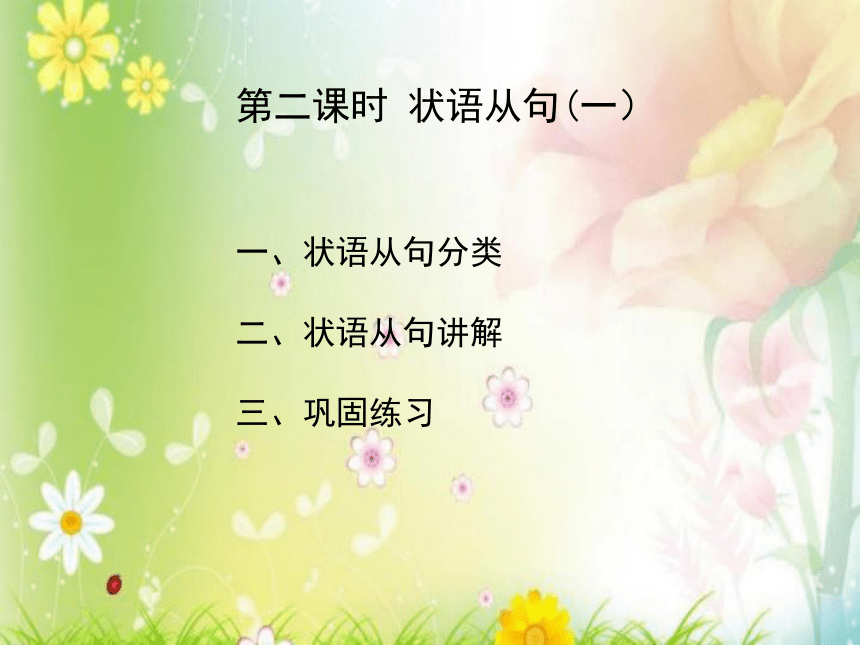
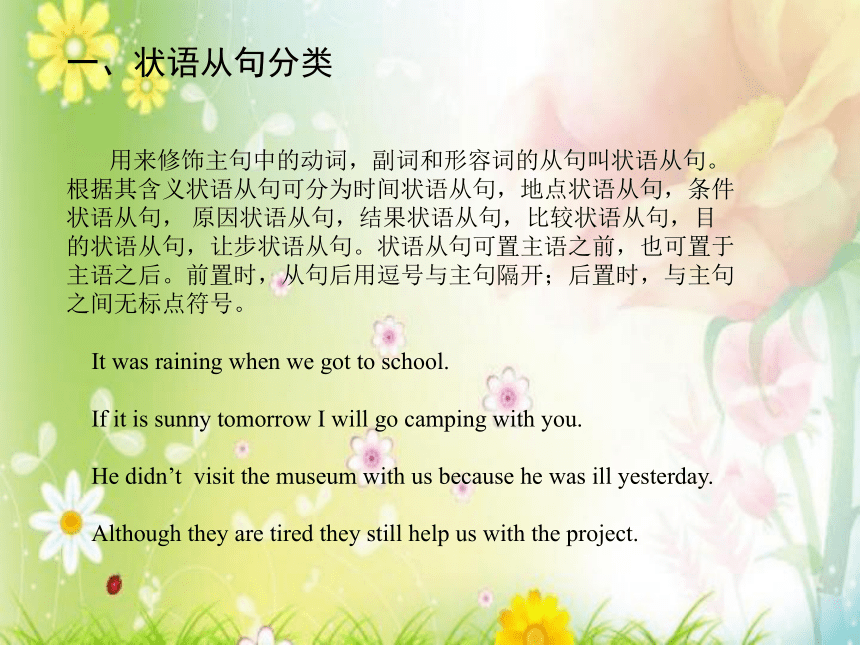
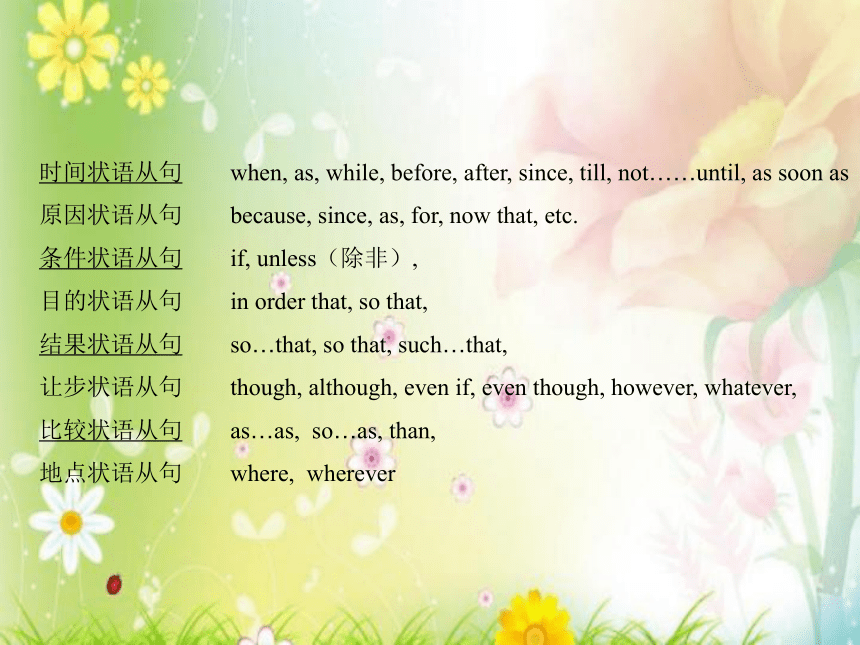
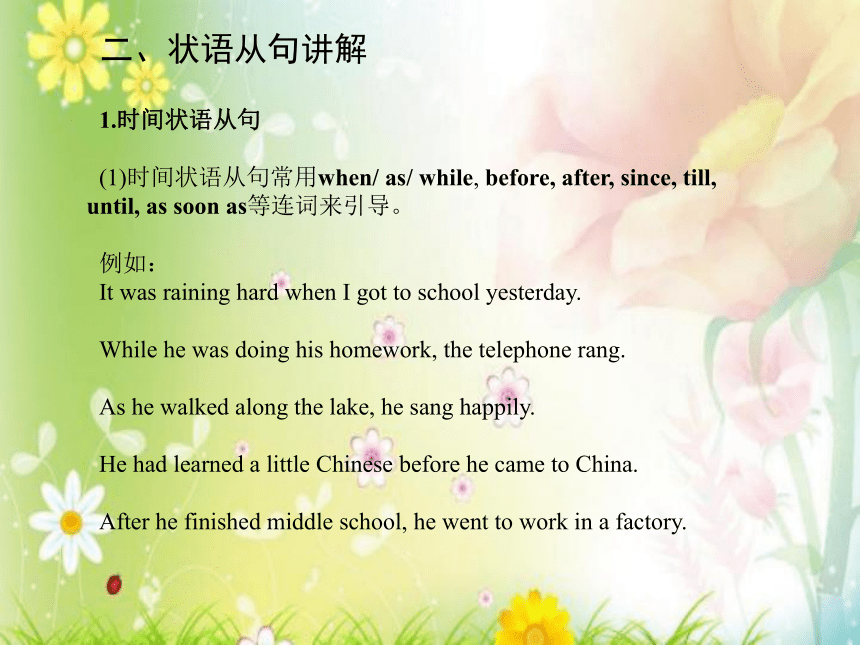
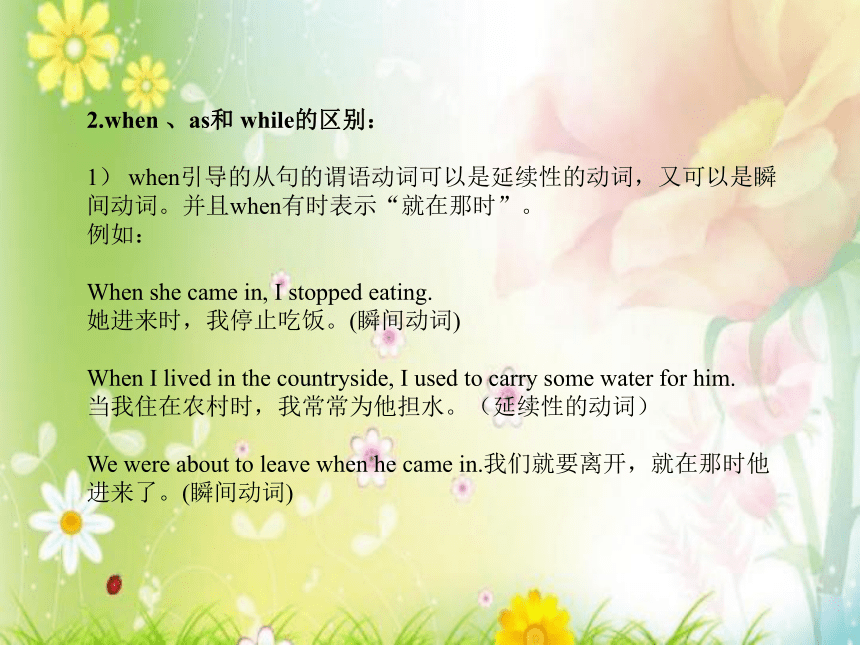
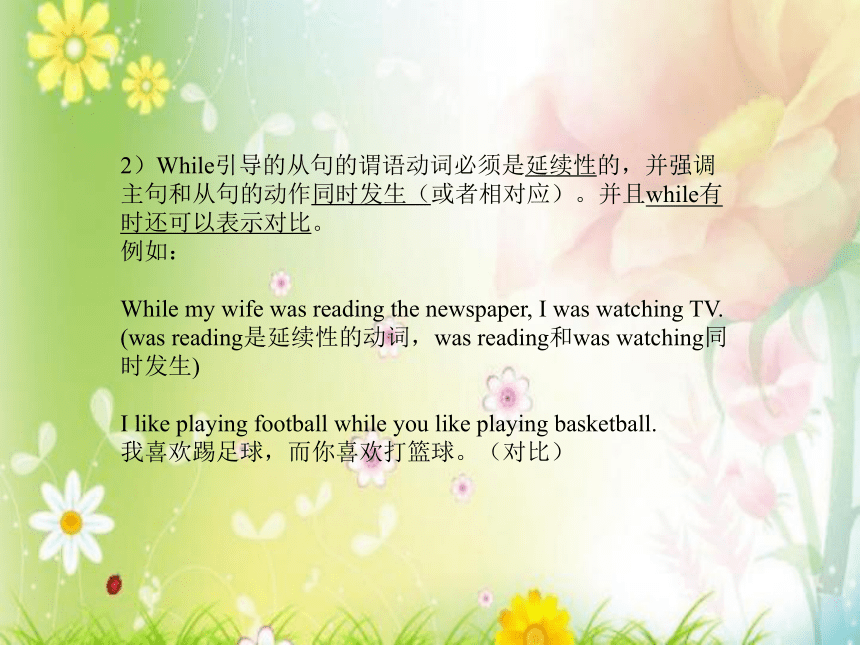
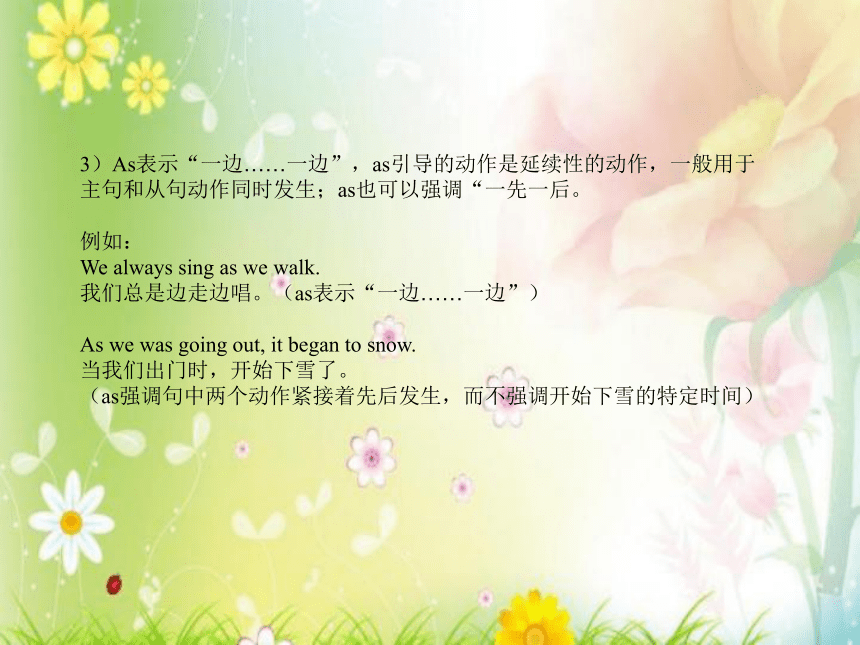
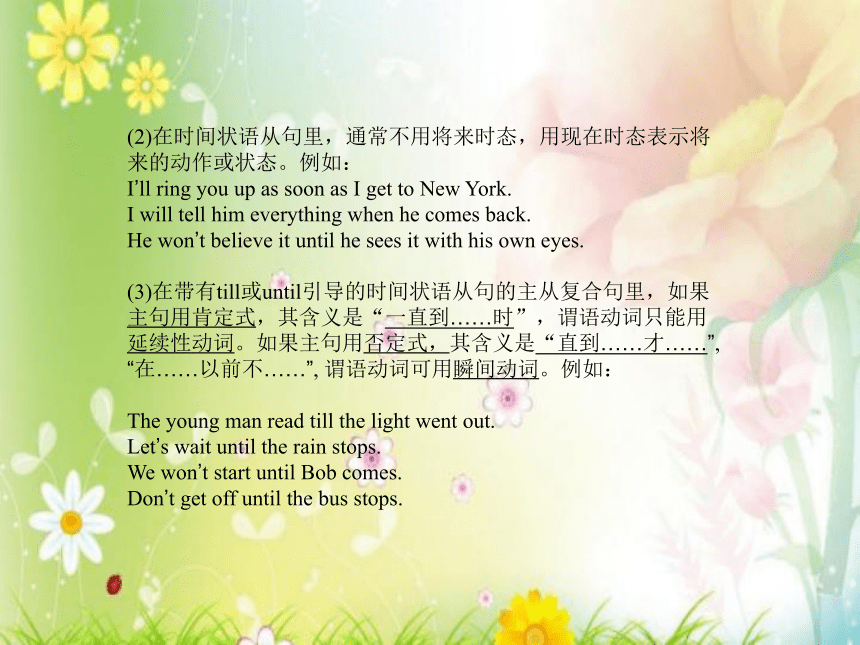
文档简介
(共23张PPT)
专题十四 并列句和复合句
中考英语语法专题
本专题内容适用于9年级学生
本专题一般共需5课时
第二课时 状语从句(一)
一、状语从句分类
二、状语从句讲解
三、巩固练习
用来修饰主句中的动词,副词和形容词的从句叫状语从句。根据其含义状语从句可分为时间状语从句,地点状语从句,条件状语从句, 原因状语从句,结果状语从句,比较状语从句,目的状语从句,让步状语从句。状语从句可置主语之前,也可置于主语之后。前置时,从句后用逗号与主句隔开;后置时,与主句之间无标点符号。
It was raining when we got to school.
If it is sunny tomorrow I will go camping with you.
He didn’t visit the museum with us because he was ill yesterday.
Although they are tired they still help us with the project.
一、状语从句分类
时间状语从句 when, as, while, before, after, since, till, not……until, as soon as
原因状语从句 because, since, as, for, now that, etc.
条件状语从句 if, unless(除非),
目的状语从句 in order that, so that,
结果状语从句 so…that, so that, such…that,
让步状语从句 though, although, even if, even though, however, whatever,
比较状语从句 as…as, so…as, than,
地点状语从句 where, wherever
1.时间状语从句
(1)时间状语从句常用when/ as/ while, before, after, since, till, until, as soon as等连词来引导。
例如:
It was raining hard when I got to school yesterday.
While he was doing his homework, the telephone rang.
As he walked along the lake, he sang happily.
He had learned a little Chinese before he came to China.
After he finished middle school, he went to work in a factory.
二、状语从句讲解
2.when 、as和 while的区别:
1) when引导的从句的谓语动词可以是延续性的动词,又可以是瞬间动词。并且when有时表示“就在那时”。
例如:
When she came in, I stopped eating.
她进来时,我停止吃饭。(瞬间动词)
When I lived in the countryside, I used to carry some water for him.
当我住在农村时,我常常为他担水。(延续性的动词)
We were about to leave when he came in.我们就要离开,就在那时他进来了。(瞬间动词)
2)While引导的从句的谓语动词必须是延续性的,并强调主句和从句的动作同时发生(或者相对应)。并且while有时还可以表示对比。
例如:
While my wife was reading the newspaper, I was watching TV.
(was reading是延续性的动词,was reading和was watching同时发生)
I like playing football while you like playing basketball.
我喜欢踢足球,而你喜欢打篮球。(对比)
3)As表示“一边……一边”,as引导的动作是延续性的动作,一般用于主句和从句动作同时发生;as也可以强调“一先一后。
例如:
We always sing as we walk.
我们总是边走边唱。(as表示“一边……一边”)
As we was going out, it began to snow.
当我们出门时,开始下雪了。
(as强调句中两个动作紧接着先后发生,而不强调开始下雪的特定时间)
(2)在时间状语从句里,通常不用将来时态,用现在时态表示将来的动作或状态。例如:
I’ll ring you up as soon as I get to New York.
I will tell him everything when he comes back.
He won’t believe it until he sees it with his own eyes.
(3)在带有till或until引导的时间状语从句的主从复合句里,如果主句用肯定式,其含义是“一直到……时”,谓语动词只能用延续性动词。如果主句用否定式,其含义是“直到……才……”, “在……以前不……”, 谓语动词可用瞬间动词。例如:
The young man read till the light went out.
Let’s wait until the rain stops.
We won’t start until Bob comes.
Don’t get off until the bus stops.
( )1. It’s quite common in Britain to say “Thank you” to the drivers ____ people
get off the bus.
A. after B. since C. until D. when
( )2. I will call you as soon as I ______ the ticket to the football match.
A. will get B. get C. got D. am getting
( )3.---It’s raining, Daisy.Please________ an umbrella with you. ---Thanks. I’ll return it to you when I______ next week.
A. take, come B. take, will come C. bring,come D. bring, will come
( )4. Peter likes reading a newspaper____ he is having breakfast.
A. until B. while C. because D. though
( )5.We won’t start the meeting ______our teacher arrives.
A. though B. until C. while D. or
( D )1. It’s quite common in Britain to say “Thank you” to the drivers ____ people
get off the bus.
A. after B. since C. until D. when
( B )2. I will call you as soon as I ______ the ticket to the football match.
A. will get B. get C. got D. am getting
( A )3.---It’s raining, Daisy.Please________ an umbrella with you. ---Thanks. I’ll return it to you when I______ next week.
A. take, come B. take, will come C. bring,come D. bring, will come
( B )4. Peter likes reading a newspaper____ he is having breakfast.
A. until B. while C. because D. though
( B )5.We won’t start the meeting ______our teacher arrives.
A. though B. until C. while D. or
3. 条件状语从句
(1)条件状语从句通常由if, unless=if …not引导。例如:
What shall we do if it snows tomorrow
Don’t leave the building unless I tell you to.
(2)在条件状语从句里,谓语动词通常用现在时态表示将来的动作或状态。例如:
I’ll help you with your English if am free tomorrow.
He won’t be late unless he is ill.
(3)“祈使句 + and (or)+ 陈述句” 在意思上相当于一个带有条件状语从句的复合句。例如:
Hurry up, or you’ll be late.
=If you don’t hurry up, you’ll be late.
Study hard and you will pass the exam.
=If you study hard, you will pass the exam.
4.If 和when双面孔:
区分if和when引导宾语从句和状语从句的不同:When引导时间状语从句的时候意为“当…的时候”,引导宾语从句的时候意为“什么时候”;If 引导条件状语的时候意为“如果”,引导宾语从句意为“是否”。
( )1. —Mike wants to know if ___ a picnic tomorrow.
—Yes. But if it ___, we'll visit the museum instead
A. you have; will rain B. you will have; will rain
C. you will have; rains D. will you have; rains
( )2. —Do you know when he ___ back tomorrow?
—Sorry, I don't. When he ___ back, I'll tell you
A. comes; comes B. comes; will come
C. will come; comes D. will come; will come
C
C
( )1. — Tommy, do you know if Frank ____ to the zoo this Sunday if it ____
— Sorry, I have no idea.
A. will go; is fine B. goes; is fine C. will go; is going to be fine D. goes; will be fine
( )2. I bet Mrs. Black will come to help us with the celebration
if she ______ too busy tomorrow.
A. is B. will be C. won’t be D. isn’t
( )3. —David, turn off the TV________ no one is watching it.
—But it_______ off already!The music is from the radio. A. so that , has been turned B. when, has turned C. if, has been turned D. because, has turned
( )4.—Could we play football in your playground, Sir
—No, _____ you have the principal’s note.
A. if B. unless C. because D. since
( )5.--I hear Jack Chan will come to Laiwu next week.
--Really _______ he comes, my younger sister will be very happy,
A.If B.Until C.Unless D.Before
( A )1. — Tommy, do you know if Frank ___ to the zoo this Sunday if it ___
— Sorry, I have no idea.
A. will go; is fine B. goes; is fine C. will go; is going to be fine D. goes; will be fine
( D )2. I bet Mrs. Black will come to help us with the celebration
if she ______ too busy tomorrow.
A. is B. will be C. won’t be D. isn’t
( C )3. —David, turn off the TV________ no one is watching it.
—But it_______ off already!The music is from the radio. A. so that , has been turned B. when, has turned C. if, has been turned D. because, has turned
( B )4.—Could we play football in your playground, Sir
—No, _____ you have the principal’s note.
A. if B. unless C. because D. since
( A )5.--I hear Jack Chan will come to Laiwu next week.
--Really _______ he comes, my younger sister will be very happy,
A.If B.Until C.Unless D.Before
5.原因状语从句
(1)原因状语从句通常由because, since, as引导。例如:
He didn’t come to school because he was ill.
As it is raining, we shall not go the zoo.
Since you can’t answer the question, I’ll ask someone else.
(2)because表示直接原因,语气最强。Because引导的原因状语从句多放在主句之后。回答由why提出的问题,只能用because。As和since语气较弱,一般用来表示明显的原因。由as和since引导的原因状语从j句多放在句首。例如:
------Why aren’t going there
------Because I don’t want to.
As he has no car, he can’t get there easily.
Since we have no money, we can’t buy it.
(3)because和so不能同用在一个句子里。
1.____ you’ve got a chance, you might as well make full use of it.
A. Now that B. After C. Although D. As soon as
〔答案〕 A
〔解析〕 主句与从句之间存在因果关系, 且“you’ve got a
chance”表示一个显而易见的原因, 因此应选用表原因的now
that。
2.He found it increasingly difficult to read, ____ his eyesight was
beginning to fail.
A.and B. for C. but D. or
〔答案〕 B 〔解析〕 “his eyesight was beginning to fail”是
“he found it increasingly difficult to read”的原因, 因此本题应
选用可以表示原因的连词for引导原因状语从句。
3. A man cannot smile like a child, ____ a child smiles with his
eyes, while a man smiles with his lips alone.
A. so B. but C. and D. for
典型例题
巩固练习
填空
1.The teacher didn't leave ______ twelve o'clock.
2. Strike ________ the iron was hot.
3. _____ they arrived there, they started to work at once.
4. He won’t believe it _______ he sees it with his own eyes.
5. ______ you came to visit me, I was reading.
6. People do not know the value of health ______ they lose it.
7. I haven't heard from him _____ he went to America.
8. He won't be here _____ he is invited.
巩固练习
填空
1.The teacher didn't leave until twelve o'clock.
2. Strike when the iron was hot.
3. As soon as they arrived there, they started to work at once.
4. He won’t believe it unless he sees it with his own eyes.
5. When you came to visit me, I was reading.
6. People do not know the value of health before they lose it.
7. I haven't heard from him since he went to America.
8. He won't be here unless he is invited.
1.(2020山东滨州)8.—I think I am the shyest in my class. What should I do
—Be more active in class, ____ you can improve your ability to express yourself.
A.so that B.unless C.or D.although
2.(2020四川凉山)15.—Let’s go camping if it_______ next Saturday.
—But nobody knows if it _________.
A.is fine; rains B.will be fine: rains
C.is fine: will rain D.will be fine: will rain
3.(2020贵州安顺)5.Even if we learn something well, we will forget it ________ we use it.
A.while B.until C.unless
4.(2020安徽)8.Our English teacher is nice and patient she is very strict with us.
A.if B.as C.unless D.though
中考习题
A
C
C
D
5.(2020湖南岳阳)4.The movie Nezha is_______ educational ______ I want to see it again.
A.so; that B.such; that C.too; to
6.(2020江苏南京)1.We still know little about the Moon ______ men have landed on it.
A.if B.since C.although D.because
7.(2020辽宁丹东)9.I don’t like Sun Cinema ________ it has bad service.
A.because B.although C.unless D.until
8.(2020山西)4.Swimming is, of course, interesting. But ________ we plan to go swimming, being safe must come first.
A.though B.when C.unless
9.(2020江西)3.It was great in the end ________ we had a terrible time at the beginning.
A.if B.unless C.when D.although
C
C
B
D
B
课时总结
状语从句 引导词
举例
时间 when, as, while, before, after, since, till, not……until, as soon as While he is sleeping, his son is crying.
条件 if, unless If you get the news, what will happen
原因 because, since, as, for, now that They have to go to the station because they will see each other off.
Thank you for listening
专题十四 并列句和复合句
中考英语语法专题
本专题内容适用于9年级学生
本专题一般共需5课时
第二课时 状语从句(一)
一、状语从句分类
二、状语从句讲解
三、巩固练习
用来修饰主句中的动词,副词和形容词的从句叫状语从句。根据其含义状语从句可分为时间状语从句,地点状语从句,条件状语从句, 原因状语从句,结果状语从句,比较状语从句,目的状语从句,让步状语从句。状语从句可置主语之前,也可置于主语之后。前置时,从句后用逗号与主句隔开;后置时,与主句之间无标点符号。
It was raining when we got to school.
If it is sunny tomorrow I will go camping with you.
He didn’t visit the museum with us because he was ill yesterday.
Although they are tired they still help us with the project.
一、状语从句分类
时间状语从句 when, as, while, before, after, since, till, not……until, as soon as
原因状语从句 because, since, as, for, now that, etc.
条件状语从句 if, unless(除非),
目的状语从句 in order that, so that,
结果状语从句 so…that, so that, such…that,
让步状语从句 though, although, even if, even though, however, whatever,
比较状语从句 as…as, so…as, than,
地点状语从句 where, wherever
1.时间状语从句
(1)时间状语从句常用when/ as/ while, before, after, since, till, until, as soon as等连词来引导。
例如:
It was raining hard when I got to school yesterday.
While he was doing his homework, the telephone rang.
As he walked along the lake, he sang happily.
He had learned a little Chinese before he came to China.
After he finished middle school, he went to work in a factory.
二、状语从句讲解
2.when 、as和 while的区别:
1) when引导的从句的谓语动词可以是延续性的动词,又可以是瞬间动词。并且when有时表示“就在那时”。
例如:
When she came in, I stopped eating.
她进来时,我停止吃饭。(瞬间动词)
When I lived in the countryside, I used to carry some water for him.
当我住在农村时,我常常为他担水。(延续性的动词)
We were about to leave when he came in.我们就要离开,就在那时他进来了。(瞬间动词)
2)While引导的从句的谓语动词必须是延续性的,并强调主句和从句的动作同时发生(或者相对应)。并且while有时还可以表示对比。
例如:
While my wife was reading the newspaper, I was watching TV.
(was reading是延续性的动词,was reading和was watching同时发生)
I like playing football while you like playing basketball.
我喜欢踢足球,而你喜欢打篮球。(对比)
3)As表示“一边……一边”,as引导的动作是延续性的动作,一般用于主句和从句动作同时发生;as也可以强调“一先一后。
例如:
We always sing as we walk.
我们总是边走边唱。(as表示“一边……一边”)
As we was going out, it began to snow.
当我们出门时,开始下雪了。
(as强调句中两个动作紧接着先后发生,而不强调开始下雪的特定时间)
(2)在时间状语从句里,通常不用将来时态,用现在时态表示将来的动作或状态。例如:
I’ll ring you up as soon as I get to New York.
I will tell him everything when he comes back.
He won’t believe it until he sees it with his own eyes.
(3)在带有till或until引导的时间状语从句的主从复合句里,如果主句用肯定式,其含义是“一直到……时”,谓语动词只能用延续性动词。如果主句用否定式,其含义是“直到……才……”, “在……以前不……”, 谓语动词可用瞬间动词。例如:
The young man read till the light went out.
Let’s wait until the rain stops.
We won’t start until Bob comes.
Don’t get off until the bus stops.
( )1. It’s quite common in Britain to say “Thank you” to the drivers ____ people
get off the bus.
A. after B. since C. until D. when
( )2. I will call you as soon as I ______ the ticket to the football match.
A. will get B. get C. got D. am getting
( )3.---It’s raining, Daisy.Please________ an umbrella with you. ---Thanks. I’ll return it to you when I______ next week.
A. take, come B. take, will come C. bring,come D. bring, will come
( )4. Peter likes reading a newspaper____ he is having breakfast.
A. until B. while C. because D. though
( )5.We won’t start the meeting ______our teacher arrives.
A. though B. until C. while D. or
( D )1. It’s quite common in Britain to say “Thank you” to the drivers ____ people
get off the bus.
A. after B. since C. until D. when
( B )2. I will call you as soon as I ______ the ticket to the football match.
A. will get B. get C. got D. am getting
( A )3.---It’s raining, Daisy.Please________ an umbrella with you. ---Thanks. I’ll return it to you when I______ next week.
A. take, come B. take, will come C. bring,come D. bring, will come
( B )4. Peter likes reading a newspaper____ he is having breakfast.
A. until B. while C. because D. though
( B )5.We won’t start the meeting ______our teacher arrives.
A. though B. until C. while D. or
3. 条件状语从句
(1)条件状语从句通常由if, unless=if …not引导。例如:
What shall we do if it snows tomorrow
Don’t leave the building unless I tell you to.
(2)在条件状语从句里,谓语动词通常用现在时态表示将来的动作或状态。例如:
I’ll help you with your English if am free tomorrow.
He won’t be late unless he is ill.
(3)“祈使句 + and (or)+ 陈述句” 在意思上相当于一个带有条件状语从句的复合句。例如:
Hurry up, or you’ll be late.
=If you don’t hurry up, you’ll be late.
Study hard and you will pass the exam.
=If you study hard, you will pass the exam.
4.If 和when双面孔:
区分if和when引导宾语从句和状语从句的不同:When引导时间状语从句的时候意为“当…的时候”,引导宾语从句的时候意为“什么时候”;If 引导条件状语的时候意为“如果”,引导宾语从句意为“是否”。
( )1. —Mike wants to know if ___ a picnic tomorrow.
—Yes. But if it ___, we'll visit the museum instead
A. you have; will rain B. you will have; will rain
C. you will have; rains D. will you have; rains
( )2. —Do you know when he ___ back tomorrow?
—Sorry, I don't. When he ___ back, I'll tell you
A. comes; comes B. comes; will come
C. will come; comes D. will come; will come
C
C
( )1. — Tommy, do you know if Frank ____ to the zoo this Sunday if it ____
— Sorry, I have no idea.
A. will go; is fine B. goes; is fine C. will go; is going to be fine D. goes; will be fine
( )2. I bet Mrs. Black will come to help us with the celebration
if she ______ too busy tomorrow.
A. is B. will be C. won’t be D. isn’t
( )3. —David, turn off the TV________ no one is watching it.
—But it_______ off already!The music is from the radio. A. so that , has been turned B. when, has turned C. if, has been turned D. because, has turned
( )4.—Could we play football in your playground, Sir
—No, _____ you have the principal’s note.
A. if B. unless C. because D. since
( )5.--I hear Jack Chan will come to Laiwu next week.
--Really _______ he comes, my younger sister will be very happy,
A.If B.Until C.Unless D.Before
( A )1. — Tommy, do you know if Frank ___ to the zoo this Sunday if it ___
— Sorry, I have no idea.
A. will go; is fine B. goes; is fine C. will go; is going to be fine D. goes; will be fine
( D )2. I bet Mrs. Black will come to help us with the celebration
if she ______ too busy tomorrow.
A. is B. will be C. won’t be D. isn’t
( C )3. —David, turn off the TV________ no one is watching it.
—But it_______ off already!The music is from the radio. A. so that , has been turned B. when, has turned C. if, has been turned D. because, has turned
( B )4.—Could we play football in your playground, Sir
—No, _____ you have the principal’s note.
A. if B. unless C. because D. since
( A )5.--I hear Jack Chan will come to Laiwu next week.
--Really _______ he comes, my younger sister will be very happy,
A.If B.Until C.Unless D.Before
5.原因状语从句
(1)原因状语从句通常由because, since, as引导。例如:
He didn’t come to school because he was ill.
As it is raining, we shall not go the zoo.
Since you can’t answer the question, I’ll ask someone else.
(2)because表示直接原因,语气最强。Because引导的原因状语从句多放在主句之后。回答由why提出的问题,只能用because。As和since语气较弱,一般用来表示明显的原因。由as和since引导的原因状语从j句多放在句首。例如:
------Why aren’t going there
------Because I don’t want to.
As he has no car, he can’t get there easily.
Since we have no money, we can’t buy it.
(3)because和so不能同用在一个句子里。
1.____ you’ve got a chance, you might as well make full use of it.
A. Now that B. After C. Although D. As soon as
〔答案〕 A
〔解析〕 主句与从句之间存在因果关系, 且“you’ve got a
chance”表示一个显而易见的原因, 因此应选用表原因的now
that。
2.He found it increasingly difficult to read, ____ his eyesight was
beginning to fail.
A.and B. for C. but D. or
〔答案〕 B 〔解析〕 “his eyesight was beginning to fail”是
“he found it increasingly difficult to read”的原因, 因此本题应
选用可以表示原因的连词for引导原因状语从句。
3. A man cannot smile like a child, ____ a child smiles with his
eyes, while a man smiles with his lips alone.
A. so B. but C. and D. for
典型例题
巩固练习
填空
1.The teacher didn't leave ______ twelve o'clock.
2. Strike ________ the iron was hot.
3. _____ they arrived there, they started to work at once.
4. He won’t believe it _______ he sees it with his own eyes.
5. ______ you came to visit me, I was reading.
6. People do not know the value of health ______ they lose it.
7. I haven't heard from him _____ he went to America.
8. He won't be here _____ he is invited.
巩固练习
填空
1.The teacher didn't leave until twelve o'clock.
2. Strike when the iron was hot.
3. As soon as they arrived there, they started to work at once.
4. He won’t believe it unless he sees it with his own eyes.
5. When you came to visit me, I was reading.
6. People do not know the value of health before they lose it.
7. I haven't heard from him since he went to America.
8. He won't be here unless he is invited.
1.(2020山东滨州)8.—I think I am the shyest in my class. What should I do
—Be more active in class, ____ you can improve your ability to express yourself.
A.so that B.unless C.or D.although
2.(2020四川凉山)15.—Let’s go camping if it_______ next Saturday.
—But nobody knows if it _________.
A.is fine; rains B.will be fine: rains
C.is fine: will rain D.will be fine: will rain
3.(2020贵州安顺)5.Even if we learn something well, we will forget it ________ we use it.
A.while B.until C.unless
4.(2020安徽)8.Our English teacher is nice and patient she is very strict with us.
A.if B.as C.unless D.though
中考习题
A
C
C
D
5.(2020湖南岳阳)4.The movie Nezha is_______ educational ______ I want to see it again.
A.so; that B.such; that C.too; to
6.(2020江苏南京)1.We still know little about the Moon ______ men have landed on it.
A.if B.since C.although D.because
7.(2020辽宁丹东)9.I don’t like Sun Cinema ________ it has bad service.
A.because B.although C.unless D.until
8.(2020山西)4.Swimming is, of course, interesting. But ________ we plan to go swimming, being safe must come first.
A.though B.when C.unless
9.(2020江西)3.It was great in the end ________ we had a terrible time at the beginning.
A.if B.unless C.when D.although
C
C
B
D
B
课时总结
状语从句 引导词
举例
时间 when, as, while, before, after, since, till, not……until, as soon as While he is sleeping, his son is crying.
条件 if, unless If you get the news, what will happen
原因 because, since, as, for, now that They have to go to the station because they will see each other off.
Thank you for listening
同课章节目录
- 词法
- 名词
- 动词和动词短语
- 动词语态
- 动词时态
- 助动词和情态动词
- 非谓语动词
- 冠词
- 代词
- 数词和量词
- 形容词副词及其比较等级
- 介词和介词短语
- 连词和感叹词
- 构词法
- 相似、相近词比较
- 句法
- 陈述句
- 一般疑问句和否定疑问句
- 特殊疑问句及选择疑问句
- 反意疑问句
- 存在句(There be句型)
- 宾语从句
- 定语从句
- 状语从句
- 主谓一致问题
- 简单句
- 并列句
- 复合句
- 主谓一致
- 主、表语从句
- 名词性从句
- 直接引语和间接引语
- 虚拟语气
- 感叹句
- 强调句
- 倒装句
- 祈使句
- 句子的成分
- 句子的分类
- 题型专区
- 单项选择部分
- 易错题
- 完形填空
- 阅读理解
- 词汇练习
- 听说训练
- 句型转换
- 补全对话
- 短文改错
- 翻译
- 书面表达
- 任务型阅读
- 语法填空
- 其他资料
